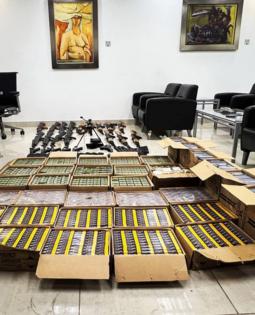Commission on human rights hears calls for tougher U.S. action on Haiti guns
Published in News & Features
The U.S. based dealers who are selling high-powered assault rifles that are later illegally trafficked to armed criminal gangs in Haiti are a handful of “bad actors” who can be reined in with tightened U.S. efforts, experts told a human-rights panel on Tuesday.
“These dangerous business practices can be stopped in several ways. One is strong, sensible laws and regulations,” Jonathan Lowy, the founder and president of Global Action on Gun Violence, said. Lowy added that safer sales practices enacted at the state or federal levels would also go a long way in curbing Haiti’s arms crisis.
“But also, reforms can be achieved voluntarily by gun dealers and by manufacturers who can choose” who they sell to, he added.
Lowy was one of three experts who addressed the Inter-American Commission on Human Rights as members sought to get a better understanding on the relationship between illegal arms trafficking and the violence in Haiti. The watchdog group, an arm of the Organization of American States, is hosting public hearings at the University of Miami this week. The topic of arms trafficking and its impact on Haiti is among several topics that made it onto the commission’s agenda.
Christopher Hernandez-Roy, a senior fellow and deputy director of the Americas Program at the Center for Strategic and International Studies, said because most of the trafficked weapons in Haiti is from the United States, U.S. enforcement must be strengthened.
Noting Haiti’s inability to police its own coasts, Hernandez-Roy said more must also be done by nations in the region to help. “Strengthening community-based reporting networks and tracing capabilities will improve targeting and trafficking network,” he said.
United Nations independent human rights expert William O’Neill highlighted the impact of the illegal arms trade on gang violence, the displacement of Haitians from their homes and gender-based violence.
After hearing from the panel, commission members expressed dismay, with one saying she was “speechless.” Pedro Vaca Villarreal, Special Rapporteur for Freedom of Expression, criticized the lack of Haitian representation before making a special plea for press freedom and journalists in Haiti.
“These weapons have been used in the murders and attempted murders of journalists, especially those reporting on gang activity, corruption and the collusion between state and criminal actors,” he said. Threats and attacks targeting family members have been used as a pressure tactic to silence or punish journalists’ work, while attacks against the media, including shootings, the targeting of newsrooms an the destruction of broadcasting equipment, have also been employed, he said.
Journalists are avoiding certain neighborhoods, limiting their coverage of sensitive issues and reducing their field work, while some are abandoning the profession altogether, Vaca Villareal said.
“The results is a population deprived of essential information at a time transparency and independent journalism are more necessary than ever,” he added.
On Thursday, the United Nations noted that attacks have continued to force Haitians to flee their homes, most recently from the eastern neighborhoods of Port-au-Prince, where specialized units were carrying out anti-gang operations not far from the U.S. Embassy.
“These incidents come as the security situation in the capital continues to deteriorate. Attacks in the residential areas of Thomassin and Fermathe – previously considered relatively safe – drove more than 1,800 to seek safety elsewhere,” Farhan Haq, deputy spokesperson for the U.N. secretary-general, told journalists in New York.
“By the end of October, the number of people displaced by violence had reached 1.4 million – the highest level recorded in the country and up by more than a third from last year,” he added. “With insecurity rising, we urge all parties to protect civilians and ensure safe, rapid, unhindered humanitarian access to every community in need.”
The human rights situation in Haiti “has reached a boiling point,” O’Neill told the Inter-American Commission, explaining that since his last visit to the country in March more areas have come under siege, while children continue to be recruited, and women are sexually assaulted. The death toll has surpassed 4,000 already this year.
While reiterating his push for sanctions against those supporting gangs, and the need for international financing and troop support for a U.N. approved but yet-to-be-deployed Gang Suppression Force for Haiti, O’Neill also made a special plea for children.
It is essential, he said, for Haiti to establish a child-friendly justice system “that recognizes children trafficked and recruited by gangs primarily as victims, ensures their rehabilitation and reintegration into society, and holds those responsible for their trafficking accountable.”
Within the gangs, he said, “children, usually boys, some of them as young as 10 years old, are provided with weapons and coerced into using them, turning them into active participants in criminality and serious human rights abuses,” he said. “The trafficking and exploitation of children by gangs has devastating consequences – these children face the risk of being killed in clashes with the police or self-defense groups, or of spending their childhood in prison under dire detention conditions, and of suffering lifelong psychological trauma.”
©2025 Miami Herald. Visit at miamiherald.com. Distributed by Tribune Content Agency, LLC.







Comments